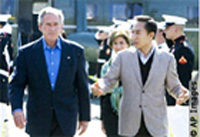Presidential Visit
U.S., South Korea Want North to Declare Nature of Weapons Program

Presidents Bush, left, and the President Lee Myung-bak of South Korea hold talks at Camp David in Maryland. (© AP Images)
North Korea must complete its obligations, presidents say
April 21, 2008
By Merle D. Kellerhals, Jr.
Staff Writer
Washington -- Once North Korea declares the details of its nuclear weapons development program in a verifiable way, the next steps in the process can be determined, say Presidents Bush and Lee Myung-bak of South Korea.
Both leaders agree that the Six-Party Talks to halt North Korea's nuclear weapons ambitions, often quite detailed and seemingly slow-moving, have made considerable progress in influencing North Korea to dismantle its plutonium production facility at Yongbyon. "And now North Korea must fulfill its other obligations: provide a full declaration of its nuclear programs and proliferation activities in a verifiable way," Bush says.
The other nations engaged in the talks -- China, Japan and Russia -- are not going to accept a deal that does not advance the interests of the region, Bush said. "The whole objective of the Six-Party Talks and framework is to get [North Korea] to talk about activities, nuclear activities."
The crucial element in this extensive diplomatic initiative, Bush said, is to get the leader of North Korea to give up his nuclear weapons ambitions.
In recent weeks, U.S. and North Korean negotiators reached agreement to resume the talks after they had stalled late last year, though full details have not been discussed publicly.
The two presidents held consultations at the Camp David presidential retreat in Maryland, outside Washington, April 18-19. The talks focused on North Korea and the six-nation negotiations, the prospects for a free-trade agreement between the two countries, and future U.S. combat troop levels in South Korea.
At a joint news briefing April 19, Lee said that the U.S.-South Korean alliance is pivotal in ensuring peace and stability on the Korean Peninsula, but also throughout Northeast Asia. "Now as the international situation as well as the economic and security situation change[s] dramatically, our alliance is also called upon to undergo new changes," Lee said.
Lee also announced that he has invited Bush to visit South Korea in summer 2008, and that the president and first lady Laura Bush have accepted.
Bush and Lee said neither nation harbors hostile intentions toward North Korea. "We both agreed to work together to help North Korea escape international isolation and to improve the lives of the North Korean people," Lee said.
The United States and South Korea agreed that the current level of U.S. combat forces would be maintained on the Korean Peninsula, but the United States is repositioning the troops into two main areas south of the capital, Seoul. In addition the United States and South Korea are shifting wartime operational control to the South Koreans.
Bush said the U.S. Congress must reject trade protectionism and not turn its back on a strong Northeast Asian ally like South Korea. He asked Congress to approve a free-trade agreement with Korea this year, saying it is in the interests of both nations.